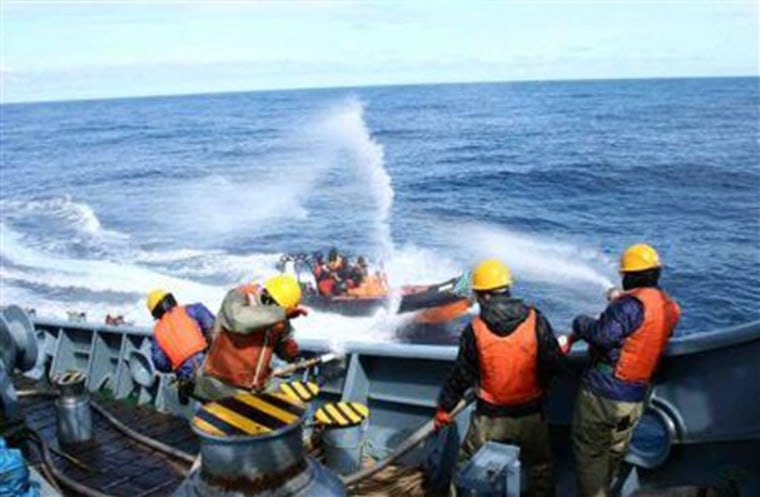Japanese whalers detained two activists accused of throwing acid at and illegally boarding their vessel in Antarctica on Tuesday. An official denied claims the men were assaulted and tied to the mast.
An Australian and Briton from the environmental group Sea Shepherd — which has been tailing ships involved in Japan's annual whale hunt — forcibly boarded the Yushin Maru No. 2 and were being held in the ship's office, Japan's government-backed Institute for Cetacean Research said in a statement.
Commercial whaling has been banned worldwide since 1966 but Japan conducts its annual whale hunts under a program it insists is for scientific purposes. Critics call it commercial whaling in disguise.
The institute denied claims by Sea Shepherd founder Paul Watson that the two were assaulted and bound to the ship with rope.
"Any accusations that we have tied them up or assaulted them are completely untrue," said institute chief Minoru Morimoto in the statement.
The two "illegally" boarded the Yushin Maru after attempting to entangle the propellers of the vessel using ropes and throwing bottles of acid onto the decks, Morimoto said.
"They are being held in custody while decisions are made on their future," Morimoto said.
'Terrorist' group, whalers say
Watson said earlier the two men — Australian Benjamin Potts, 28, and Briton Giles Lane, 35 — were assaulted and tied to the railing of the whaler and later bound to the ship's radar mast.
Hideki Moronuki, the head of the whaling division at Japan's Fisheries Agency, said: "I strongly deplore any suggestion that our crew would engage in actions that violate sound seamanship."
"The Sea Shepherd is a terrorist organization. We do not consider anything they say as credible," Moronuki said.
Watson said the men were trying to deliver a letter to the captain of the Japanese ship "to inform them that they were illegally killing whales" in Antarctic waters. He said the crew would "do everything physically possible short of inflicting injury" to stop the hunt.
Japan says it must kill whales to study them. It then sells the meat, which is allowed under International Whaling Commission rules.
Japan defends whaling as a national tradition and a vital part of its food culture. It claims whale stocks have sufficiently recovered since 1986 to allow the resumption of limited hunts.
The detentions were the latest in a string of disputes between anti-whaling activists and the Japanese fleet both on the high seas and in the courts.
Australian judge rules against hunt
On Tuesday, Australian Federal Court Judge James Allsop ruled that Kyodo Senpaku Kaisha, the company that operates Japan's hunting ships, broke Australian law by whaling inside Australia's exclusive economic zone, which extends 200 nautical miles from Australian-declared territory in Antarctica.
Allsop found that Kyodo Senpaku Kaisha had "killed, injured, taken and interfered" with minke, fin and humpback whales inside the zone — which is designated as a whale sanctuary under Australian law — and ordered that the company "be restrained" from future hunts.
Killing a whale is punishable by up to two years in prison under Australian law.
But Japan, like most countries, does not recognize Australia's territorial claim on Antarctica or its surrounding waters and says Australia has no authority to enforce its domestic laws on the high seas.
